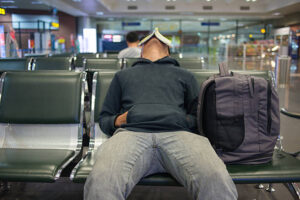Snorers can find it hard to get enough peaceful rest during their travels. The fear of disturbing others might trigger a little bit of insomnia and you could end up tossing and turning while others on an airplane, bus, or inside a shared room might be enjoying deep and peaceful sleep. When you finally do fall asleep, there always tends to be someone to awaken you from your slumber to tell you to try to be a bit quieter.
Long trips can be quite embarrassing to those who snore, especially if you tend to snore quite loudly. Luckily, there are quite a few anti-snoring solutions out there that can help you get the needed rest even while you are out and about. Let’s take a look at some of the best travel tips that can make life a little bit easier for those who snore.
Take Along Your Own Pillow

We tend to snore a lot more and a lot louder when our airways are constricted. Sleeping on a strange pillow that doesn’t have a suitable height for your body will undoubtedly cause you to snore a lot more than usual. It is always better to take along your own pillow during sleepovers. The home scent of your own pillow will make it much easier to fall asleep, and you will reduce the risk of straining your neck during the night.
Anti-snoring pillows like wedge pillows or smart pillows can also be a terrific option for traveling. Wedge pillows will help open up your airways so you can breathe with ease, while smart pillows like the Smart Snora can also lightly wake you up when you snore too loudly.
A more suitable pillow isn’t a guarantee that there won’t be any snoring, but it is a very good method for getting some shut-eye if you stress a lot about the sounds you make while you sleep.
Avoid Excessive Food and Alcohol Intake
Alcohol tends to make the muscles in your throat relax a lot more and may restrict your airways. This can cause you to forcefully inhale which can trigger very loud snoring noises.
A large and heavy meal, and especially dairy foods like milk before bed, can also irritate your airways or make you feel more bloated. This, in return, may cause you to snore a lot more.
If you are on a trip and are sharing accommodations with others, then it is usually best to avoid alcohol intake, stick to smaller portions, and avoid any dairy products that might trigger irritations in your airway.
Consider an Anti-Snoring Mouthpiece
If you have a mouth-based or tongue-based snoring, then a mouthguard can be a very helpful anti-snoring device. Anti-snoring mouthpieces can vary a little bit in their design but are mostly designed to keep your tongue from moving to the back of your throat. They also help open up the jaw and mouth a little bit so you can breathe with ease.
This is a very handy little device for traveling because mouthpieces are so small and compact. You can easily keep the little mouthguard in your carry-on bag and use it whenever it is time for a quick nap.
Try an Anti-snoring Nose Clip
 An anti-snoring nose clip can be helpful for those who tend to struggle with allergies or who have chronic sinus conditions. This little device can be inserted into the nostrils and will open up the nasal airways so more air can get into your lungs. This can prevent forceful breathing and will allow you to sleep a lot more soundly.
An anti-snoring nose clip can be helpful for those who tend to struggle with allergies or who have chronic sinus conditions. This little device can be inserted into the nostrils and will open up the nasal airways so more air can get into your lungs. This can prevent forceful breathing and will allow you to sleep a lot more soundly.
As with mouthguards, the little nose clip is very small and compact. You can easily carry it with you in your pocket.
Remember Your Nasal and Congestion Medication
It is important to take nasal sprays or congestion medication if you have a history of respiratory conditions or if your sinuses tend to become inflamed by dust and pollen. Taking your meds before bedtime will help avoid flair-ups during the night so you can sleep more soundly.
Sleep on Your Side
Sleeping on your side might not be an option if you are taking a nap on a bus or airplane but it can be a good solution for when you book into a motel or guest house. People tend to snore less when they are sleeping on their sides since the airway is a lot more open in this position. It can be good to give up your usual back sleeping position for the duration of your trip.
All of these techniques can be very helpful for keeping your snoring under control during a trip. We hope that you found at least one of these methods useful and wish you plenty of peace and quiet for your next long journey.





